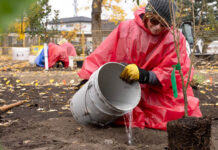
How you feel about the place where you live impacts so many aspects of your life, which is why it’s very important to feel safe and protected in your neighborhood. You’re more likely to get out for a walk, chat with your neighbors, enjoy working in your garden, sleep soundly at night, and just generally feel at ease if you know your community is as safe and as welcoming as possible.
Sometimes it’s up to you to help make positive changes in your community, and to rally others to help you do it. If you feel that there are ways your neighborhood could make improvements as far as safety and security are concerned, consider the following ideas a jumping off point:
- Plan a Take Back the Night event. Take Back The Night is a charitable foundation whose mission is to create safe communities and respectful relationships through awareness events and initiatives. According to the organization’s website, they seek to end sexual assault, domestic violence, dating violence, sexual abuse and all forms of sexual violence. Hundreds of Take Back the Night events are held in over 30 countries annually, including walks, rallies and vigils. Visit Take Back The Night or their Facebook page for more information on the organization and how you can plan an event in your own community.
- Institute a buddy system. If there are women in your community who are working shifts or taking night classes and riding transit late at night, organize a buddy system to ensure that those women are never walking alone.
- Find out about on-demand transit services. Some public transit systems will allow riders to ask bus drivers to stop at locations anywhere along the route after dark. Find out if your local transit system offers this service. If it does, make sure members of your community know about it by posting signs in your building or on public message boards in community centers and libraries. You might even ask your local paper to write an article about the service. If your transit system doesn’t offer the service, request that they consider it.
- Get to know your neighbors. Meeting your neighbors and finding out more about them is certainly nice, but it can also make your neighborhood safer. It means you know who is home during the day, who should and shouldn’t be coming and going, and what behavior might be suspicious and cause for concern. When everyone has this kind of information, they know to check in on each other if anything seems amiss.
- Keep the porch lights on. It simply makes sense that a well-lit street with well-lit homes is less appealing to people who like to lurk in the dark. Ask your neighbors to turn their porch lights on at dusk and off at dawn to keep your whole street shining brightly through the night.
- Join or organize a neighborhood watch program. Neighborhood watch programs help communities raise awareness and minimize crime, and give them control over, and responsibility for, security. For tips on starting a neighborhood watch program, visit Safewise. You can also contact your local police department for advice and information about setting up these kinds of groups.
- Spruce up neglected areas. Work together with neighbors to clean up graffiti, pick up trash, and trim overgrown shrubs and gardens. This helps to boost community spirit, but it also makes these areas less appealing to those who are up to no good.
- Know (and share) the basics of staying safe while on vacation. There are some important ways to keep your home safer while you’re away or not at home in the evening.
- Hire security. If your neighborhood is particularly prone to crime, it’s worth considering hiring a security company to monitor the area. If you all pitch in or have a community fundraiser, it may make hiring a reputable service more affordable.
- Keep connected. Make sure to keep the lines of communication open between you and your neighbors. If you see something suspicious, tell someone. If you’ve heard about recent car thefts or break-ins near by, share that information. The more aware and watchful everyone is, the safer your community will be.
For more information on how to be vigilant and keep your community safer, visit Safe Home.
417024C CAN/US (04/19)




